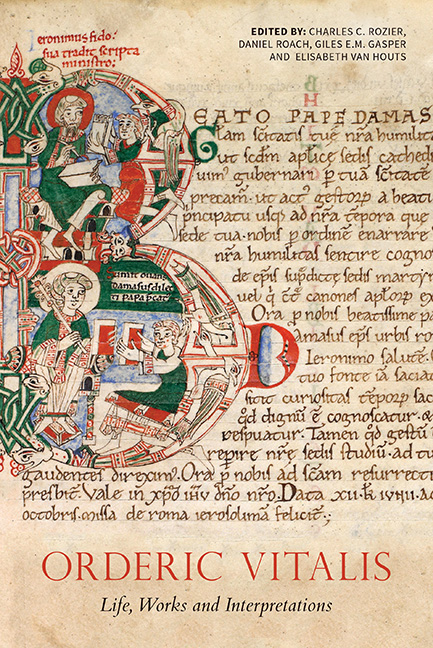Book contents
- Frontmatter
- Dedication
- Contents
- List of Illustrations
- Acknowledgements
- List of Abbreviations
- Chronology of the Lives of Odelerius and his Son Orderic Vitalis
- Composition of the Historia ecclesiastica
- Introduction: Interpreting Orderic Vitalis
- Orderic and his Father, Odelerius
- Following the Master's Lead: The Script of Orderic Vitalis and the Discovery of a New Manuscript (Rouen, BM, 540)
- Orderic Vitalis as Librarian and Cantor of Saint-Évroul
- Saint-Évroul and Southern Italy in Orderic's Historia ecclesiastica
- Orderic and English
- Inscriptions in Orderic's Historia ecclesiastica: A Writing Technique between History and Poetry
- Reading Orderic with Charters in Mind
- Orderic Vitalis and the Cult of Saints
- Orderic's Secular Rulers and Representations of Personality and Power in the Historia ecclesiastica
- Worldly Woe and Heavenly Joy: The Tone of the Historia ecclesiastica
- Orderic Vitalis, Historical Writing and a Theology of Reckoning
- Jesus Christ, a Protagonist of Anglo-Norman History? History and Theology in Orderic Vitalis's Historia ecclesiastica
- ‘Studiosi abdita investigant’: Orderic Vitalis and the Mystical Morals of History
- Meanders, Loops, and Dead Ends: Literary Form and the Common Life in Orderic's Historia ecclesiastica
- Orderic and the Tironensians
- ‘One single letter remained in excess of all his sins …’: Orderic Vitalis and Cultural Memory
- The Reception of Orderic Vitalis in the Later Middle Ages
- Appendix 1 Archaeological Investigations at the Abbey of Saint-Évroult-Notre-Dame-des-Bois
- Appendix 2 Descriptive Catalogue of Manuscripts Featuring the Hand of Orderic Vitalis
- Select Bibliography
- List of Manuscripts Cited
- General Index
‘Studiosi abdita investigant’: Orderic Vitalis and the Mystical Morals of History
Published online by Cambridge University Press: 25 October 2017
- Frontmatter
- Dedication
- Contents
- List of Illustrations
- Acknowledgements
- List of Abbreviations
- Chronology of the Lives of Odelerius and his Son Orderic Vitalis
- Composition of the Historia ecclesiastica
- Introduction: Interpreting Orderic Vitalis
- Orderic and his Father, Odelerius
- Following the Master's Lead: The Script of Orderic Vitalis and the Discovery of a New Manuscript (Rouen, BM, 540)
- Orderic Vitalis as Librarian and Cantor of Saint-Évroul
- Saint-Évroul and Southern Italy in Orderic's Historia ecclesiastica
- Orderic and English
- Inscriptions in Orderic's Historia ecclesiastica: A Writing Technique between History and Poetry
- Reading Orderic with Charters in Mind
- Orderic Vitalis and the Cult of Saints
- Orderic's Secular Rulers and Representations of Personality and Power in the Historia ecclesiastica
- Worldly Woe and Heavenly Joy: The Tone of the Historia ecclesiastica
- Orderic Vitalis, Historical Writing and a Theology of Reckoning
- Jesus Christ, a Protagonist of Anglo-Norman History? History and Theology in Orderic Vitalis's Historia ecclesiastica
- ‘Studiosi abdita investigant’: Orderic Vitalis and the Mystical Morals of History
- Meanders, Loops, and Dead Ends: Literary Form and the Common Life in Orderic's Historia ecclesiastica
- Orderic and the Tironensians
- ‘One single letter remained in excess of all his sins …’: Orderic Vitalis and Cultural Memory
- The Reception of Orderic Vitalis in the Later Middle Ages
- Appendix 1 Archaeological Investigations at the Abbey of Saint-Évroult-Notre-Dame-des-Bois
- Appendix 2 Descriptive Catalogue of Manuscripts Featuring the Hand of Orderic Vitalis
- Select Bibliography
- List of Manuscripts Cited
- General Index
Summary
The time has long since passed when Bishop Stubbs could say that William of Malmesbury ‘aspired to the art of history’, implying a failure on William's part to attain the lofty standards of the august art. But while the realisation that medieval monks did not try (and fail) to attain modern standards of historiography is becoming universally accepted, the standards, methods, and aims of medieval monastic historiography are still a matter of discussion. In what follows I would like to make two closely interrelated points about Orderic Vitalis as a historian addressing and guiding his audience: first, that Orderic provided an accurate and substantial description of his ideal reader, that is, the sort of reader likely to derive benefit from reading his works; and second, that grasping the characteristics of Orderic's ideal reader will illuminate Orderic's own aims and methods in writing.
Let us begin by revisiting the following, perhaps deceptively familiar, passage from Book VIII of the Historia ecclesiastica:
I find many things in the pages of Scripture which, if they are subtly interpreted, seem to resemble the happenings of our own time. But I leave the allegorical implications and explanations appropriate to human customs to be interpreted by scholars, and propose now to relate a little further the simple history of Norman affairs.
Now, I use the term ‘deceptively familiar’ here because this passage has been noted and discussed by most students of Orderic's methods and aims as a historian, but with a great variety of translations and interpretations. Chibnall, whose translation is quoted above, appears to indicate that Orderic surrendered questions of morals and spiritual exegesis to scholars – her translation of Orderic's studiosi – while Orderic himself remained content with transmitting simple and unadulterated facts. Ray, however, gives a very different rendering of this same passage in his article on Orderic and his readers:
The point [of this passage] certainly is not that Orderic has here gotten demur about ‘allegoricae allegations’ […] On the contrary, he simply wants it known that his major business is to provide ‘simplex historia’. For those who want stronger meat he enters encouragement to press on – which, by the way, is pretty good medieval pedagogy, since in raising the question of higher meanings and leaving it open on the firm footing of ‘simplex historia’, he permitted the reader to make his own discovery of the text's moral possibilities.
- Type
- Chapter
- Information
- Orderic Vitalis: Life, Works and Interpretations , pp. 284 - 297Publisher: Boydell & BrewerPrint publication year: 2016



